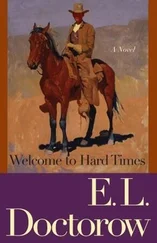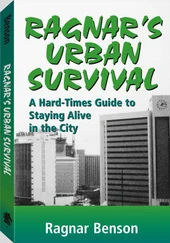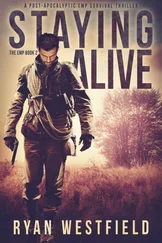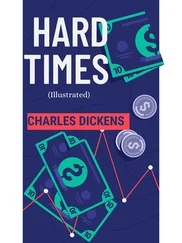Ragnar Benson - Ragnar's Urban Survival - A Hard-Times Guide to Staying Alive in the City
Здесь есть возможность читать онлайн «Ragnar Benson - Ragnar's Urban Survival - A Hard-Times Guide to Staying Alive in the City» весь текст электронной книги совершенно бесплатно (целиком полную версию без сокращений). В некоторых случаях можно слушать аудио, скачать через торрент в формате fb2 и присутствует краткое содержание. Год выпуска: 2009, ISBN: 2009, Жанр: Старинная литература, на английском языке. Описание произведения, (предисловие) а так же отзывы посетителей доступны на портале библиотеки ЛибКат.
- Название:Ragnar's Urban Survival: A Hard-Times Guide to Staying Alive in the City
- Автор:
- Жанр:
- Год:2009
- ISBN:1581600593
- Рейтинг книги:5 / 5. Голосов: 1
-
Избранное:Добавить в избранное
- Отзывы:
-
Ваша оценка:
- 100
- 1
- 2
- 3
- 4
- 5
Ragnar's Urban Survival: A Hard-Times Guide to Staying Alive in the City: краткое содержание, описание и аннотация
Предлагаем к чтению аннотацию, описание, краткое содержание или предисловие (зависит от того, что написал сам автор книги «Ragnar's Urban Survival: A Hard-Times Guide to Staying Alive in the City»). Если вы не нашли необходимую информацию о книге — напишите в комментариях, мы постараемся отыскать её.
Ragnar's Urban Survival: A Hard-Times Guide to Staying Alive in the City — читать онлайн бесплатно полную книгу (весь текст) целиком
Ниже представлен текст книги, разбитый по страницам. Система сохранения места последней прочитанной страницы, позволяет с удобством читать онлайн бесплатно книгу «Ragnar's Urban Survival: A Hard-Times Guide to Staying Alive in the City», без необходимости каждый раз заново искать на чём Вы остановились. Поставьте закладку, и сможете в любой момент перейти на страницу, на которой закончили чтение.
Интервал:
Закладка:
Obviously the above list is at least 5,000 items fewer than complete. All of these items share the characteristic of being small, portable, somewhat durable, and almost essential in many circumstances. They are also all consumables. The only variation is that some of the desirable items are capital goods or tools-as things with which to make other things are called.
These are my favorite trade goods. Based on past experience, especially in large cities, I like ammunition, matches, and flashlights and batteries. Thirty years ago, for example, I purchased 1 million rounds of ammunition from Interarmco in Alexandria, Virginia. The cost was 2 cents per round. On the way home I was really concerned. What were we going to do with all this 8mm Lebel, 8 x 57mm and 7 x 57mm Mauser, .303 British, and other assorted pistol ammo? Not to worry, the boss advised. Unlike firearms, which are not generally consumed, ammunition is used up in large quantities. Guns that use this stuff will probably still be here in 50 years, but ammunition supplies are always shrinking. He was right. We put a price of 8 to 10 cents per round on the ammo. In 6 weeks enoug.:i was sold to pay for the entire original purchase. The last 80 percent was profit.
Wholesale ammunition dealers currently report sales of tens of millions of rounds of ammunition. Every time the government beats the gun control drum, citizens start laying in even more ammunition. Eventually Al of this will come out again in one form or another. Perhaps I am wrong and there will be no scarcity. But scarcities are often regional. I wouldn't take chances on not having enough ammo on the outside chance that there will be too much to trade when cities go down. If you as a city survivor do not have enough ammo of the correct kind, it will be very serious indeed.
Lowly, cheap kitchen matches are another often overlooked trade item that is always in tremendous demand by city survivors. Several characteristics of matches quickly lead to this circumstance. Unless we smoke, under -normal circumstances of life we currently use relatively few matches. As a result, nobody thinks about them. In survival circumstances, especially in cities, we will have opportunity to use scores of matches every day. We will need matches for lighting stoves, lamps. cookers, smokers: starting fires; burning trash; and dozens of other uses that will quickly become apparent.
Difficult as it is to believe, city survivors report using about three 250-match boxes per month! Careful conservation can cut this to about two boxes per month. But I would prefer to purchase and store a bale of matches now while they are easily available.
Some types of trade goods are frequently viewed with a jaundiced eye even by city survivors in desperate circumstances. Home-canned meat and vegetables are good examples. People just will not trade for something unknown that they think might have potential to harm them. Convincing them that you eat this same stuff every night might work, but don't be surprised when it doesn't!
Reloaded ammunition is another of these suspicious items. Amateur gun owners are fearful of reloads, while experienced gun owners already reload their own ammunition. Little demand remains in the middle for reloads. Test this theory at your next gun show. Take a big box of reloaded ammo in and see what kind of offers you get. Desperation could turn this philosophy a bit; we will have to see. In the interim, don't get too excited when reloads are not viewed as desirable trade goods.
Medicine
Fresh medications in original sealed bottles stamped with current expiration dates are always very desirable. Out-of-date or scruffy-looking medications are viewed with suspicion. Individuals without needed medications are often forced to pay virtually any price to secure vital supplies. I recently encountered a dramatic example in Cuba. A mid-ranking bureaucrat working in the government tourist bureau had a seriously epileptic 4-year-old daughter. We believed that her ever-more-frequent seizures would soon lead to permanent damage. Absolutely none of the medication the little girl desperately needed was available in Cuba. Her father was willing to pay any price for drugs that would only have cost $8 at most in American pharmacies.
The point, of course, is that some drugs in some specific circumstances will be priceless. Everything we currently use should be stockpiled in a goodly quantity. Most drugs gradually lose their vitality when kept past their expiration date. Freezing helps prolong the life of many medicines, arguing again for use of a freezer in city survival circumstances.
Accumulating medical supplies for possible sale or trade is, at best, an extremely complex, elusive issue. It is compounded by the fact that our society does not trust its citizens with drug purchase decisions. Not only do we not know which medications might be in demand, we have trouble getting them within our current system.
Nevertheless, in spite of great resistance from the ruling elite medical profession, drugs can be accumulated for trade. Summarizing very briefly, these sources can be the following:
1. Sympathetic medical professionals who surreptitiously supply needed medications to be stockpiled by survivors.
2. The local livestock health counter, which offers veterinary medical supplies. These drugs, intended for animals, are safe, clean, and effective.
3. Counterfeit prescript ions-those authorizing pieces of paper which are easy to make on a home computer. Stay away from any narcotics to avoid attention.
4. Importation from foreign countries where laws are not so monopolistic. Do this either in person or by mail. Pioneered in the late 1980s by AIDS patients, this has become a major source of supply for many people.
5. Cross-use of more easily obtained, over-the-counter medical supplies. Potent hemorrhoid medication, for instance, containing high percentages of Lidocaine can be used as topical pain killers when sewing up wounds.
I have written two books on this complex subject. Those with a sense of understanding and interest in medical procedures and medications will do well to secure copies of Survivor's Medicine Chest and Do-It-Yourself Medicine. Both are available from Paladin Press, and the information in them is not repeated here.
Luxuries
The durability of luxury goods as trade items always amazes and shocks me. There is something about consumption of this class of goods that touches a nerve, especially when trading with people in life-and-death circumstances. Often we see obviously poor people living on the brink of survival trading for expensive shoes, watches, makeup, jewelry, booze, and tobacco. There may be some hidden linkage, but it is often difficult to see how ownership of these goods adds to one's chances for survival.
Often we see luxury goods traded for long-term durable goods such as a set of wrenches. a shovel, or my all-time favorite, ax or maul handles (which are :.ompletely, absolutely irreplaceable in any real survival circumstance). My old granddad wouldn't even own a car. "Can't make money with a car," he claimed, so he always owned and drove a truck Cars can be used in business as well as trucks, but granddad had a point. The same philosophy seems to hold true for luxury goods. How one will create a better survival situation for himself and chose at the retreat with a box of cigars rather than a shovel is now beyond the scope of this book. So we drop the question. Preparing to profit from such human failing is also a question. Do we really lay in cases and cases of fine whiskey in the hope and belief we will be able to trade for vital goods? I suspect not.
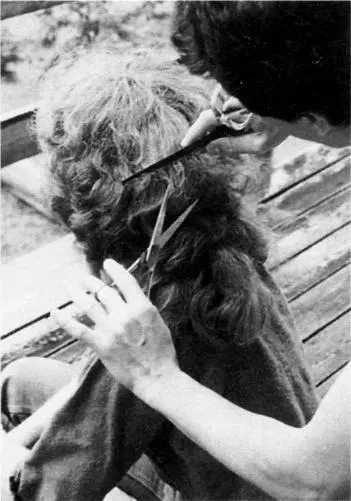
Интервал:
Закладка:
Похожие книги на «Ragnar's Urban Survival: A Hard-Times Guide to Staying Alive in the City»
Представляем Вашему вниманию похожие книги на «Ragnar's Urban Survival: A Hard-Times Guide to Staying Alive in the City» списком для выбора. Мы отобрали схожую по названию и смыслу литературу в надежде предоставить читателям больше вариантов отыскать новые, интересные, ещё непрочитанные произведения.
Обсуждение, отзывы о книге «Ragnar's Urban Survival: A Hard-Times Guide to Staying Alive in the City» и просто собственные мнения читателей. Оставьте ваши комментарии, напишите, что Вы думаете о произведении, его смысле или главных героях. Укажите что конкретно понравилось, а что нет, и почему Вы так считаете.

